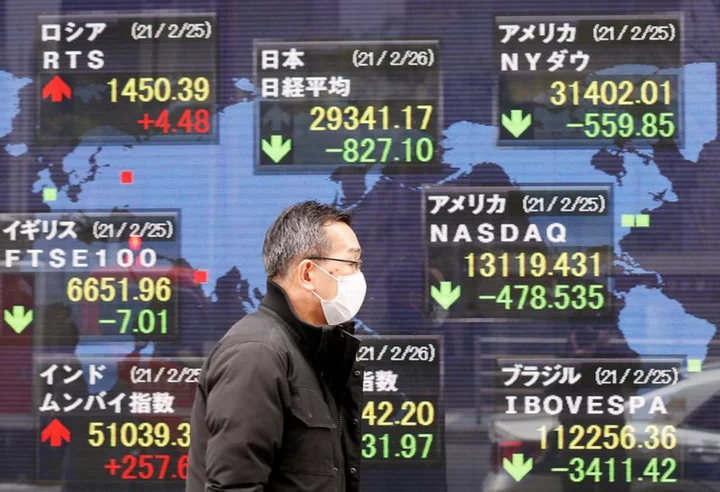By Mike Dolan
LONDON August has been rough so far for emerging market stocks and western government bonds, a worrying confluence that may extend losses from 'geo-investment' standoffs and reflect an increasingly polarised world economy.
Northern summer months can be a dangerous time to over-interpret financial market moves. Thin trading volumes and exaggerated price swings notoriously deliver bum steers during holiday periods.
But they can also crystallise brewing problems.
The COVID pandemic and Russia's invasion of Ukraine last year threaten a fragmentation of trade globalisation between western democracies and emerging economies, centred on ideas of national security, supply chain risks and economic dominance - or 'de-risking' in Washington parlance.
Isolated Russia aside, the standoff is squarely between the world's two biggest economies - the United States and China - and feeds most immediately off military threats and alliances, where Beijing stands with Moscow over Ukraine and asserts its own claim to Taiwan.
Blocs have formed around both - notably the G7/G10 or broader European Union economies on one side and a core BRICS grouping of key emerging markets Brazil, Russia, India, China and South Africa on the other.
But trade curbs and checks are morphing this year more into restrictions on bilateral capital flows, investment and even banking - something financial markets and investors may now have to durably price in as potential risks way beyond relative economic performance or valuations. Severe G7 sanctions on investment in Russia over the past 18 months are testament to the potential.
The signing last week by U.S. President Joe Biden of an executive order prohibiting new U.S. investment in sensitive Chinese technologies like computer chips - and strict government monitoring of investment in other tech sectors - shows the direction of travel. And it is just the latest in series of tit-for-tat moves from both sides.
And with China's post-COVID recovery running into the ground and suffering a deepening real estate bust, western investment curbs throw more sand in the wheels. By extension, the reliance of the rest of the emerging world on China's economic engine, commercial links and commodity demand raises more questions western investment in a broader BRICS-oriented developing world.
A question now is whether a retreat of western money from emerging markets at least partly explains both their recent underperformance and that of western government bonds, in which emerging central banks and sovereign funds are heavily invested.
While more fundamental takes on growth, inflation and interest rates dominate the investment discussion, August moves have painted a very particular picture - underscored by a resurgence of the U.S. dollar worldwide.
Led by outsized weighting for China's flailing stock market - now down almost 6% in dollar terms for the year so far - MSCI's emerging market stock index has fallen as much as 7% in August. For 2023 to date, it has underperformed the MSCI all-country index by about 10 percentage points.
Perhaps more pointedly, indices of MSCI emerging stocks excluding China have only gained 7% this year - less than half the gains on the S&P500 index. The picture has not been much better in aggregate emerging bond indices, even if they have done marginally better than developed world counterparts, and worries over emerging high-yield and property linked bonds are rising.
'COMPETITIVE CONFRONTATION'?
Have global investors high-tailed it from emerging markets already? Worryingly for many, it appears not - much like a still massively overweight position in bonds.
Bank of America's global fund manager survey out on Tuesday showed the biggest absolute investor positioning of all sectors and assets was in emerging equities - with more than a net 30% of investors overweight and the second biggest monthly increase in position of all categories.
And relative to 20-year averages, that overall position is almost one standard deviation above - only bonds and staples have higher positioning relative to historical norms.
According to Institute for International Finance data, emerging market equity and debt securities attracted an additional $32.8 billion last month alone - the biggest month of inflows since January.
While a return of flows to China debt may seem sensible as Beijing scrambles to cut interest rates again, the yuan is back on the slide for any dollar-based investor and it hit its lowest in nine months on Tuesday after a 2.6% fall this month.
By contrast, high octane hedge fund money appears to have headed in the opposite direction and dumped shares in Chinese companies in the second quarter.
And beyond the yuan, the dollar's building head of steam against emerging currencies this month is another indication of difficult positioning as long-term U.S. real rates climb anew to 14-year highs.
The rouble has plunged again, forcing a maxi 350bp rate hike by Russia's central bank this week and talk of new capital controls. Argentina's free-falling peso was devalued sharply again on Monday amid domestic political upsets.
India's rupee is also on the slide and flirting with record lows. The previously buoyant Brazilian real and South African rand have also fallen back this month.
If western money grows more wary and is increasingly warned off China and other selective emerging investments, will there be a mutual pullback of official emerging money from western bond markets?
Certainly the price action at the long-end of the Treasury and other western government bond markets this month might have you question that.
After all Chinese entities still hold more than $800 billion of Treasuries and Hong Kong, India, Brazil, Saudi Arabia and South Korea entities hold about $900 billion more.
These are banked national reserves and savings, but marginal or strategic shifts would make an outsize difference.
It all brings a different dimension to what Morgan Stanley's China strategists described as era of 'competitive confrontation' and path toward 'multipolarity'.
Referring to the latest Biden order, their only crumb of comfort was that "a full decoupling is not our base case."
The opinions expressed here are those of the author, a columnist for Reuters.
(by Mike Dolan, Twitter: @reutersMikeD; Editing by Richard Chang)

